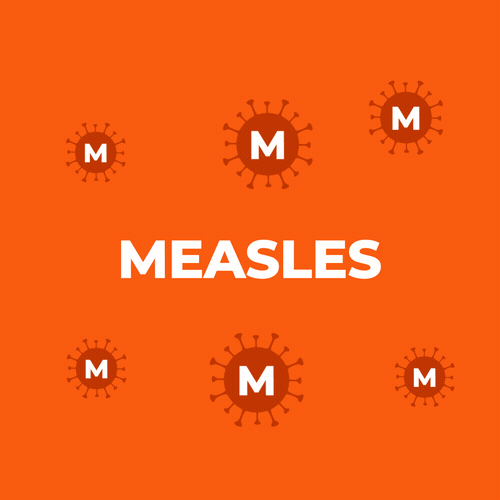Immunisation has dipped and measles cases are rising. In the European region, measles rates have not been this high in 25 years.
From January 2026, the UK will offer the second dose of measles vaccine at the age of 18 months instead of at the age of three or four. The first dose will continue to be given at 12 months.

The move is inspired by research showing better vaccine uptake when the second dose of measles vaccine is offered earlier. France takes a similar approach, but there are a variety of schedules across Europe.
Why the change?
First, a quick reminder that measles is one of the most contagious viruses in the world. In the absence of immunity, an infected child spreads the virus to 16-18 others.
Two doses of measles vaccines, which is recommended and offered free of charge across Europe, protect against infection. If 95% of children have their vaccines, outbreaks in the community are prevented (thanks to ‘herd immunity’).

The second dose of measles vaccine is offered around the age of four or five years in, for example, Croatia, Ireland and Denmark, and at 11 or 12 years in Bulbaria, Hungary and Norway. (Check the ECDC Vaccine Scheduler or national authorities to see your local vaccine calendar – or ask your healthcare provider.)
However, WHO/Unicef data show a decline in uptake of the second measles vaccine. On average, 94% of babies in Europe have their first measles vaccine, but just 91% have their second dose. Three percentage points may seem small, but it represents a large group of children who are not fully vaccinated – and takes the region further from the 95% target.
London: Learning from experience
In London, seven of the city’s 32 boroughs changed the timing of the second dose in the early 2000s amid ongoing outbreaks, offering the jab at 15-18 months. Researchers found that, in areas offering the vaccine earlier, uptake was 3.3% higher.
In a forthcoming paper, another team of UK scientists used mathematical models to show that giving the second dose earlier decreased the number of cases in a simulated outbreak. And they showed that moving the second vaccine later than current age would risk higher case numbers.
Based on the changing evidence, the UK has updated its childhood schedule. This is no mean feat as it requires the introduction of a new routine appointment for children aged 18 months for babies born after 1 July 2024. Announcing the move, authorities specifically highlighted the experience of London boroughs that had protected more children by changing the timing of the measles-mumps-rubella (MMR) vaccine.
‘The UK government’s decision to roll out the 2nd dose of the MMR vaccine across the country at 18 months, starting in January, is based on expert scientific advice from the Joint Committee on Vaccination and Immunisation (JCVI), following evidence of improved uptake in London when offered at an earlier age,’ said Dr Mary Ramsay, Director Public Health Programmes at the UK Health Security Agency.
‘The first dose will continue to be offered at one year and a new single vaccination combining MMR and Varicella, MMRV, will now replace MMR for both doses as part of the routine childhood vaccination schedule.’
The UK had not previously offered the varicella vaccine which protects children against chickenpox. Dr Ramsay noted that the MMRV vaccine rollout is already widely used in other countries, such as Germany, Canada and the United States and is part of the UK’s 10 Year Health Plan which includes expanding access to vaccines.
‘This is the first time protection against another disease has been added to the UK routine childhood vaccination programme since the MenB vaccine in 2015,’ she said.
New evidence, new policy
The revised vaccine schedule is likely to prompt analysis elsewhere, particularly in countries struggling to hit measles vaccination targets – or those with particularly large gaps between uptake of the first and second doses.
For the UK, the move can be seen as an example of evidence-informed public health policy. Perhaps decision-makers had the old line from John Maynard Keynes in mind when considering a policy revamp: When the facts change, I change my mind.




